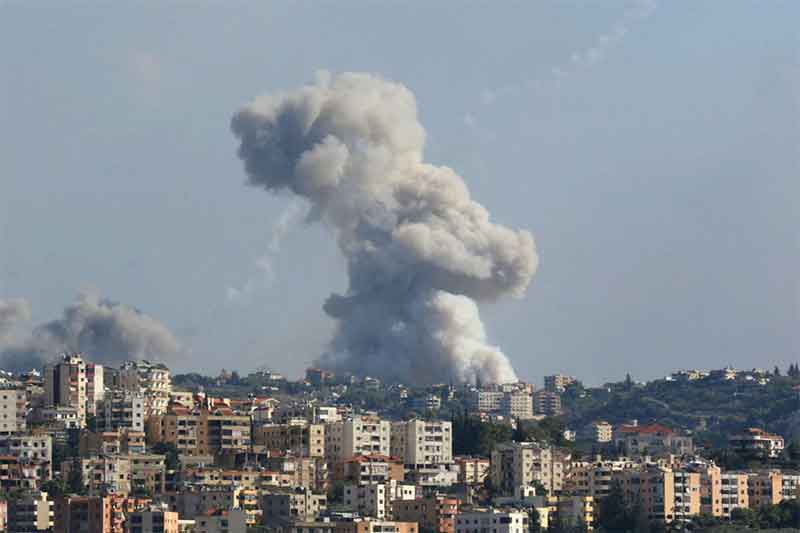
Israel first does something extremely aggressive and then proceeds to surge ahead further in its next round of aggression. Till only recently, analysts were debating more about the response of other powers to Israel’s aggression, as in the case of the assassination of Ismail Haniyeh, but now the discussion is more about how Israel follows one escalation after another on its own, without any effective restraint from any national or international force.
During the last week one horrible aggression after another has followed. The terror attacks on communication devices were followed by massive bombing of Lebanon on September 23, all this leading to over 600 deaths and very painful injuries to over 5000 persons, displacement of thousands of people, all this happening on just three days of the most unacceptably high and unjust aggression. At the time of writing there are reports of attacks continuing. The escalation has been so huge that western leaders and representatives have spoken in terms of threats of ‘full-scale war’.
However the more important question is what they have done to prevent or check this, both as world leaders and as major suppliers of arms to Israel, and about this we have not heard. In fact there appears to be almost the complete absence of any effective national or international restraining force as Israel under Netanyahu marches from one major escalation to another, ignoring even internal voices for non-escalation and peace.
Of course the customary international voices for peace and restraint are still there, in fact quite a few, but these are merely statements being made for the sake of it. If we are discussing in terms of restraint that is real and effective, then we have seen hardly any signs of this in the course of these three very dangerous days of late September as 600 people died and over 5000 were injured in very painful ways in Lebanon.
The total population of Lebanon is only 5.4 million (or 54 lakh) and one can imagine in the context of such a small size total population that when 600 deaths and over 5000 injuries are caused on just three days, how disruptive and traumatic the impact will on the entire population.
Generally what happens in such cases of extreme aggression without a war having been declared is that when there is one day or one act of extreme aggression, then the international community gets into action to stop it, so as to avoid a repetition. But in the recent case one day of attack on communication devices was followed by another day of such attacks, and then these two were soon followed by the most extensive and destructive bombing of Lebanon in decades, without any effective stops being taken to check this aggression, although Israel’s aggression is made possible to a large extent by weapons supplied by the USA and close allies like Germany.
Of course the concerns of the civilians of North Israel displaced by Hezbolloh’s strikes are very real, but so are the concerns of civilians of Lebanon on the other side. So what needed to be done was to stop the attacks on both sides, and Hezbollah had stated that its strikes will stop with permanent ceasefire in Gaza, which in turn would have also ensured the release of Israeli hostages. So peace benefiting all sides is certainly possible, but when there are strong interests who want to prolong and escalate conflict (Netanyahu’s leadership being the most obvious example just now) then such opportunities of peace are not taken. Instead what we have is unending conflict escalation.
Most western commentators, including those critical of the USA’s Middle-East policy, have stated that the USA is keen to avoid a bigger war in the Middle-East, particularly before the November elections. At the same time, however, the USA has not taken any effective steps to check this recent escalation.
Of course Hezbollah has been responding with its own attacks to some extent, but by and large what is clear is that the escalations have been led very predominantly by Israel, confirming further that Netanyahu wants a more prolonged and wider war in which he can somehow claim some sort of ‘victory’, in a highly distorted, misguided and narrow sense of the word.
Subscribe to Our Newsletter
Get the latest CounterCurrents updates delivered straight to your inbox.
Meanwhile those in the region, including also some in Israel, and in the wider world who long for peace are increasingly distressed over the recent turn of events. While the Lebanon front is the most tense and serious just now, the aggression in Gaza is also continuing and hardly any mention is being just now regarding the peace negotiations which were being highlighted so much till only a short while back.
The peace movements and various statesmen and scholars working and speaking for peace internationally should now add Lebanon to their most serious concerns while continuing to work for peace with justice in Gaza and West Bank.
Bharat Dogra is Honorary Convener, Campaign to Save the Earth Now. His recent books include Protecting Earth for Children, Planet in Peril, Man over Machine and A Day in 2071.









































